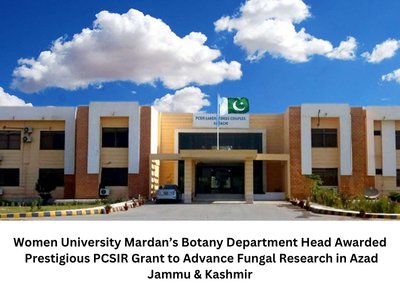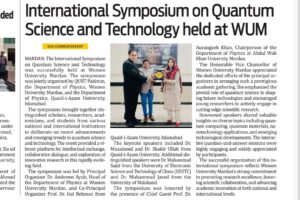
Women University Mardan’s Dr. Hira Bashir Secures PCSIR Grant for Groundbreaking Fungal Research in Azad Jammu & Kashmir
MARDAN – In a significant advancement for mycological research in Pakistan, Dr. Hira Bashir, Head of the Botany Department at Women University Mardan, has been awarded a substantial grant of approximately one million rupees. The funding, provided by the Pakistan Council of Scientific and Industrial Research (PCSIR) under its Development Programme, will fuel a pioneering project titled “Phylogenetic Assessment of Mushrooms of Azad Jammu & Kashmir.”
The project aims to conduct the first comprehensive, DNA-based analysis of the region’s macrofungal diversity. Azad Jammu & Kashmir (AJK) is a recognized biodiversity hotspot, yet its fungal flora remains largely unexplored. This research will move beyond traditional taxonomy to utilize cutting-edge phylogenetic methods, which map the evolutionary relationships between species. The grant, specifically for “Access to Scientific Instrumentation,” will enable the department to utilize advanced genetic sequencing technologies, providing unprecedented insights into the origins, genetic diversity, and ecological roles of these vital organisms.
This achievement underscores Dr. Bashir’s leadership and her department’s emergence as a center for excellence in fungal systematics. The project will not only produce high-impact scientific data but also provide invaluable hands-on training for graduate and undergraduate students, equipping them with skills in modern molecular biology and bioinformatics.
“This grant is a testament to the importance of understanding our natural heritage,” said Dr. Hira Bashir. “By unlocking the genetic secrets of AJK’s mushrooms, we are not only documenting biodiversity but also laying the groundwork for future discoveries in medicine, agriculture, and ecosystem conservation. This investment will empower our students and elevate our institution’s research capacity significantly.”
The research is expected to yield numerous peer-reviewed publications and establish a vital genetic database for Pakistani fungi, contributing to global efforts to map and conserve fungal biodiversity.MARDAN – In a significant advancement for mycological research in Pakistan, Dr. Hira Bashir, Head of the Botany Department at Women University Mardan, has been awarded a substantial grant of approximately one million rupees. The funding, provided by the Pakistan Council of Scientific and Industrial Research (PCSIR) under its Development Programme, will fuel a pioneering project titled “Phylogenetic Assessment of Mushrooms of Azad Jammu & Kashmir.”
The project aims to conduct the first comprehensive, DNA-based analysis of the region’s macrofungal diversity. Azad Jammu & Kashmir (AJK) is a recognized biodiversity hotspot, yet its fungal flora remains largely unexplored. This research will move beyond traditional taxonomy to utilize cutting-edge phylogenetic methods, which map the evolutionary relationships between species. The grant, specifically for “Access to Scientific Instrumentation,” will enable the department to utilize advanced genetic sequencing technologies, providing unprecedented insights into the origins, genetic diversity, and ecological roles of these vital organisms.
This achievement underscores Dr. Bashir’s leadership and her department’s emergence as a center for excellence in fungal systematics. The project will not only produce high-impact scientific data but also provide invaluable hands-on training for graduate and undergraduate students, equipping them with skills in modern molecular biology and bioinformatics.
“This grant is a testament to the importance of understanding our natural heritage,” said Dr. Hira Bashir. “By unlocking the genetic secrets of AJK’s mushrooms, we are not only documenting biodiversity but also laying the groundwork for future discoveries in medicine, agriculture, and ecosystem conservation. This investment will empower our students and elevate our institution’s research capacity significantly.”
The research is expected to yield numerous peer-reviewed publications and establish a vital genetic database for Pakistani fungi, contributing to global efforts to map and conserve fungal biodiversity.



